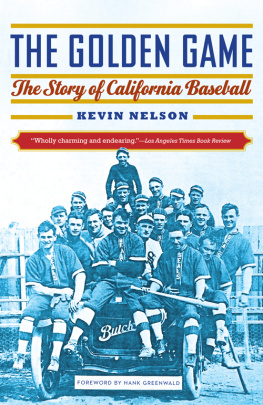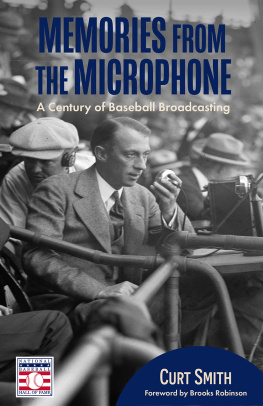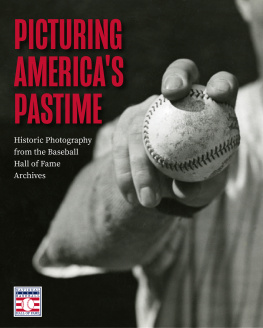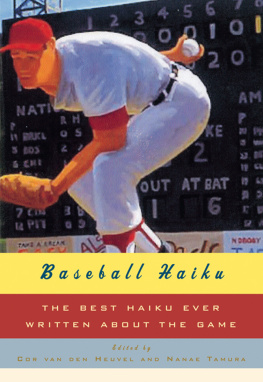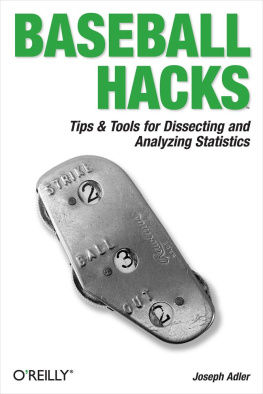The Fifth Season
BOOKS BY DONALD HONIG
Baseball When the Grass Was Real
Baseball Between the Lines
The Man in the Dugout
The October Heroes
The Image of Their Greatness
(with Lawrence Ritter)
The 100 Greatest Baseball Players of All Time
(with Lawrence Ritter)
Baseballs 10 Greatest Teams
Baseball America
The All-Star Game: An Illustrated History
Baseball: The Illustrated History of Americas Game
Shadows of Summer
The
Fifth
Season
TALES OF MY LIFE IN BASEBALL

Donald Honig

THE FIFTH SEASON. Copyright 2009 by Donald Honig. All rights reserved, including the right to reproduce this book or portions thereof in any form. For information, address: Ivan R. Dee, Publisher, 1332 North Halsted Street, Chicago 60642, a member of the Rowman & Littlefield Publishing Group. Manufactured in the United States of America and printed on acid-free paper.
www.ivanrdee.com
Library of Congress Cataloging-in-Publication Data:
Honig, Donald.
The fifth season : tales of my life in baseball / Donald Honig.
p. cm.
ISBN-13: 978-1-56663-810-4 (cloth : alk. paper)
ISBN-10: 1-56663-810-0 (cloth : alk. paper)
1. Honig, Donald. 2. SportswritersUnited StatesBiography. 3. Baseball. I. Title.
GV742.42.H66A3 2009
070.4'49796357092dc22
[B] 2008036471
For Stanley
The Fifth Season
One
 IT ISNT how profound or impressive your mind is, its knowing in detail some ludicrously obscure fact at precisely the right moment that can earn you the reputation as an authority. And once conferred, this secular canonization is hard to shake off, not that you really would want to do that. In fact the opposite happens; you strive not only to beguile people with what you know but occasionally to astonish them. Theres nothing like it. But theres something even better: now and then you are able to transcend yourself by stupefying them with some scrap of knowledge that should be so remote to human memory no normal person should have been capable of possessing it or have rational reason to. Anyway, Ill tell you exactly what happened.
IT ISNT how profound or impressive your mind is, its knowing in detail some ludicrously obscure fact at precisely the right moment that can earn you the reputation as an authority. And once conferred, this secular canonization is hard to shake off, not that you really would want to do that. In fact the opposite happens; you strive not only to beguile people with what you know but occasionally to astonish them. Theres nothing like it. But theres something even better: now and then you are able to transcend yourself by stupefying them with some scrap of knowledge that should be so remote to human memory no normal person should have been capable of possessing it or have rational reason to. Anyway, Ill tell you exactly what happened.
In the summer of 2005, Mitchell Scherr, producer of television documentaries for Major League Baseball, called and asked if he and some colleagues might come up from New York to where I lived in central Connecticut and interview me for a show they were preparing. The subject matter would include the 1951 National League pennant race, with emphasis on the Branca-Thomson version of High Noon; the sale of Babe Ruth to the New York Yankees; some Ebbets Field memories; and, because of the digressive ways of these conversations, whatever else might come flapping out of the past. Being an old Brooklyn Dodgers fan, for me 1951 was not an especially pleasant time to revisit (accounts of it read like baseballs Journal of the Plague Year), but I thought that at least I would be able to achieve some balance by tormenting Red Sox fans with a detailed account of Ruths sale to the Yankees.
We agreed on time and place, the latter being a rather large and splendid motel about two miles from my home. Arriving there at the appointed time, I went to the registration desk and asked the tall young man standing behind it where I might find the representatives of Major League Baseball. His face brightened.
Major League Baseball, he said with some feeling, as if announcing the title of a poem he was about to recite.
Thats right, I said.
Major League Baseball, he said, is in the Presidential Suite. He then gave me directions to that august quarter.
When I walked into the suite I found its tasteful accommodations occupied by five gentlemen and a setup of inquisitorial technology. Wires and power cables were strewn across the carpeting, and there were several elevated, soul-searching, and truth-demanding key lights focused on a leathery armchair where I was to sit and dispense baseball lore. It was a scene set for either a suspect or an authority; fortunately I was the latter.
The crew consisted of the lighting man; the sound man, who sat and watched a boxed dashboard of dials and little colored lights; an apprentice, whose sole function, as far as I could determine, was to stare at me while I spoke; and two representatives of Major League Baseball. These latter were Scherr, the series producer, who sat silently throughout with an evaluating face, and Roger Schlueter, the production assistant, whose job it was to sit off-camera and feed me topics and questions.
For a little more than two hours I sat under the audio cable and boom mike in that fixed flash of light and prattled away, trying to make the oft-told tales fresh and vivid. Thomson once more stroked his sempiternal home run, the deity Ruth once more was sold away to the sidewalks of Sodom, and the charm of Ebbets Field was revisited. It went smoothly, I thought, and everyone seemed satisfied.
After they packed up I accompanied them downstairs to the lobby where the MLB reps went to the desk to check out. As he watched Mitchell Scherr attend to these details, the tall young gentleman behind the desk said in an admiring voice, Major League Baseball.
Thats right, Mitchell said.
My great-uncle was a pitcher, the clerk said.
I was off to a side talking to Roger Schlueter when I heard a name mentioned.
Kemp Wicker, the clerk said.
In the back of my mind some memory chimes rustled slightly. I turned to him.
Left-handed pitcher, I said.
He smiled appreciatively. Thats right, he said with an upbeat of surprise.
Pitched for the Dodgers in 1941, I said.
With a trace of uncertainty now: I believe so.
He won just one game.
Did he?
Early in May, I said. It was against the Cardinals at Ebbets Field. He came on in relief and got the win. He pitched very well, as a matter of fact.
He did? the clerk asked. He was staring at me. They were all staring at me.
It went twelve innings, I said. In the bottom of the twelfth, Cookie Lavagetto singled through the left side, scoring Joe Medwick from second, and that was the game. Five-four, Brooklyn.
They continued to stare at me, in a way that made me feel as if Id just materialized from another galaxy.
How do you know that? Roger asked. I think he was having some difficulty keeping the skepticism out of his voice.
Its a baseball fact, I said. Check it out.
Oh, no, he said. We believe you.
A day or two later he called. We spoke about the interview for a few minutes, how satisfied theyd been with it, and then he got around to it.
About that Kemp Wicker thing, he said. We were talking about it on the way home. We figured you had to be joking around with that guy. You couldnt have remembered that.
Did you check it out?
He laughed. Well, yes, as a matter of fact. Just for the hell of it. You had it exactly right. Twelve innings, the Lavagetto hit, Medwick scoring.
And Wicker got the win.
Thats right.
Well, I said, thats what happened.
Listen, he said, how did you remember that? Those details?
It was only sixty-four years ago.
But
I dont see anything remarkable about it, I said. Im supposed to be the big authority, right?
I guess so, he said.


